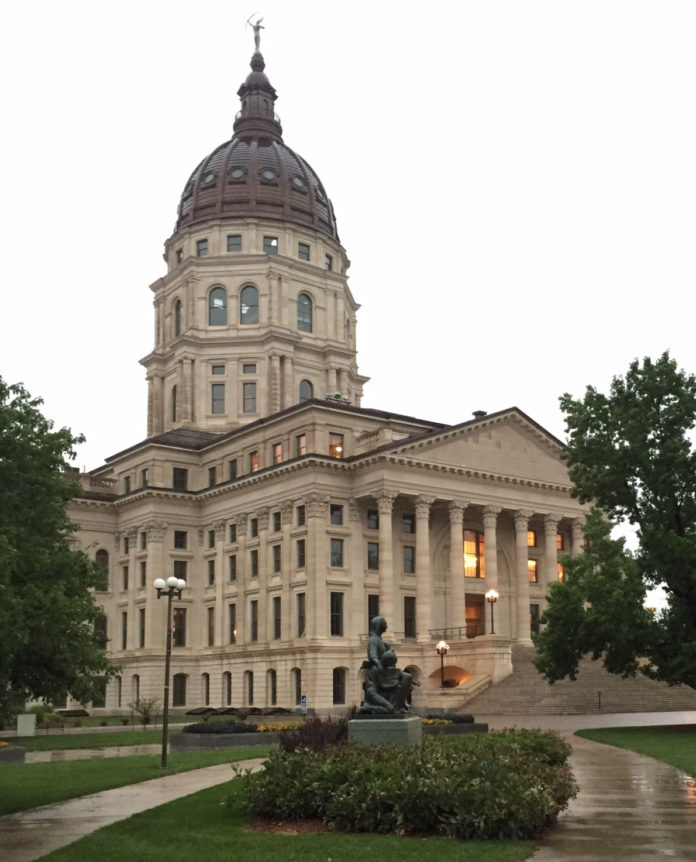A new set of congressional districts drawn by Republicans cleared the Kansas Legislature on Wednesday, setting up a possible courtroom showdown.
The Kansas House voted 85-37 to override Gov. Laura Kelly’s veto of new congressional districts that opponents said benefited Republicans at the expense of minority voters.
It came less than a day after the Senate voted 27-11 to override the governor’s veto.
The new plan, which divides Wyandotte County in half, is widely expected to end up in court with a prominent national Democratic lawyer vowing litigation if the governor’s veto was overridden.
“I can promise the state of Kansas this,” attorney Marc Elias said on MSNBC.
“If the Republican legislature overrides this veto and passes a blatantly unconstitutional map, they are going to be sued and they will lose.”
Elias’ opinion matters because he’s connected to the National Redistricting Action Fund – a 501(c)(4) spinoff of the National Democratic Redistricting Committee, which is led by former U.S. Attorney General Eric Holder.
Holder’s Democratic Redistricting Committee was heavily invested in 2020 to break up the Republican supermajority in the Kansas Legislature, knowing that it would give Kelly more leverage to veto new maps this year.
House Speaker Ron Ryckman said Elias’ comments were to be expected since he gets support from Holder’s group to bring lawsuits against redistricting plans.
“We look forward to get to the courts,” Ryckman said. “Anything short of a map that Gov. Kelly drew herself that we all agreed with was going to the courts.”
Ryckman said Democrats were preparing for litigation since last summer when they objected to the schedule for public hearings on redistricting.
“When you hear complaints that town halls are during the day and you hear complaints that a town hall is on a Monday, the same week of Thanksgiving, they’re grasping at straws,” Ryckman said.
It wasn’t easy. Like the Senate, the House had to lock down for a couple of hours until it could get the votes needed to pass the map.
Critics argued that the map dilutes minority voting strength because it moves about 112,000 Wyandotte County residents from the 3rd District into the 2nd District, including about 37,000 Hispanic or Latino residents and about 28,000 Black residents.
“When you divide communities of color, you take away a voice,” said Democratic state Rep. Tom Burroughs, of Kansas City, who led the fight against the Republican map.
“The subliminal message is that your voices don’t matter,” Burroughs said. “Your very existence and contribution to the community and the state process don’t matter.”
The new map stoked controversy because it slices off urban areas of a district now represented by Democratic Congresswoman Sharice Davids and replaces them with more rural areas farther south that lean Republican.
It also takes the liberal college town of Lawrence out of the 2nd District represented by GOP Congressman Jake LaTurner and moves it into the heavily Republican 1st District that extends all the way to the Colorado border.
The move potentially hurts Democrat Patrick Schmidt, a former Naval intelligence officer who is running against LaTurner in the 2nd District.
The new district line cuts Wyandotte County in half along Interstate 70, with the northern part of the county being moved to the 2nd District represented by Republican U.S. Rep. Jake LaTurner.
Davids gains Franklin and Anderson counties as well as all of Miami County farther south – counties won overwhelmingly by former President Donald Trump.
“Who is surprised that the Kansas GOP has targeted Kansas only female member of Congress, said Democratic state Rep. Vic Miller of Topeka.
“Who is surprised that the GOP has targeted the only person of color to represent Kansas in Congress in almost 100 years,” he said.
“This map is not about Democrat, New Yorkers, or liberals,” Miller said. “It is about being anti woman, anti people of color, anti LGBTQ, and anti Native American.”
Kelly vetoed the plan because it violated the Legislature’s redistricting guidelines that called for protecting communities of interest, preserving the core of existing congressional districts, and keeping whole counties in the same congressional district if possible.
As of Tuesday, 46 cases have been filed challenging congressional and legislative maps in 17 states as racially discriminatory and/or partisan gerrymander, according to the Brennan Center for Justice.
Thirty-one of those lawsuits are still pending, including 19 in federal court and 12 in state court.













